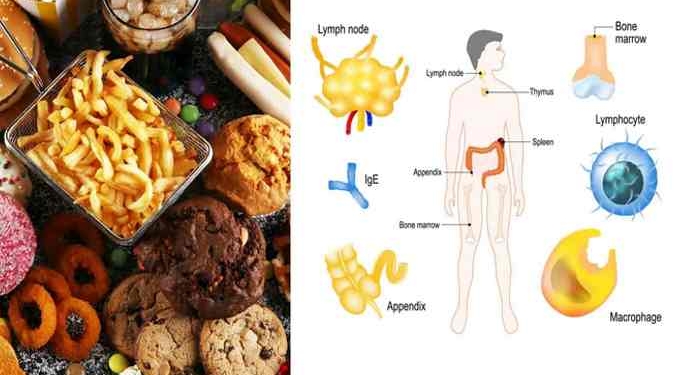
Fast food has become the easiest way for many families to get a hot meal. Americans are increasingly busier, and finding time to put dinner on the table is almost impossible for some people. However, while it may be quick and convenient to stop at the local drive-thru for a bite, what is all this saturated fat and sugar doing to the body? Specifically, what is it doing to your immune system?
Sure, an occasional hamburger from your favorite establishment isn’t going to kill you. Still, new research shows that consuming too many quick meals can have a devastating effect on your immune system.
Understanding the Shocking Nutritional Aspects of Eating Fast Foods
The problem with local takeout joints is that their food is highly processed. It’s shallow in nutrients while being very high in calories. Additionally, these take out places often use high amounts of sugar, salt, and fat to make their food taste great and last longer.
Most food sits in warming trays for long periods. They must use methods so that when customers arrive, they can quickly get their food and go. What do doctors say about junk food?
Dr. Phil Maffetone strongly opposes consuming any quick, to-go food. He states that in his studies, he has found that eating junk food is just as addicting to some people as taking drugs or alcohol. He also doesn’t buy into the healthy options offered by these establishments because they are still unhealthy enough to be classified as junk food.
Dr. Joel Fuhrman advocates for healthy eating. He is one of the many physicians that vocally oppose the effects of a poor-quality diet. His research proves that junk food has a direct link to some severe health conditions. A constant diet full of junk food will cause the following:
•Obesity
•Digestive Issues
•Type 2 Diabetes
•Cancer
•Heart Disease
•Increase Risk of Stroke
•Gastric Complications
•Depression and Anxiety
•Early Death
Junk food has a profound effect on your health. The average family frequents the local drive-thru more than they should. Did you know that more than 45 percent of the population budgets nearly half of their grocery money for eating out?
Things weren’t always this way. Going back in time about four decades, a family hardly ever ate outside the home, and they didn’t have the health concerns of today. You didn’t hear of cancer and ADHD affecting a massive amount of people.
Cancer is so rampant right now that it’s become an epidemic. Could all of these medical issues be because of a poor diet that consists of fast and other junk food varieties? Part of the problem is it’s hard to estimate your calories and keep track of fat when you’re eating on the go.
The Biggest Threat to A Quick Food Diet Is Obesity
The biggest concern regarding overeating fast food is obesity. Americans are heavier than ever, with two out of three adults falling into the overweight category. Shockingly, it’s not just adults that are large, as one-third of children are also considered obese.
The American Association of Clinical Endocrinologists states that weight problems are so out of control that obesity is now a disease. Since 1970, when Americans mostly ate their meals at home, the number of people that struggle with weight has more than doubled.
Obesity comes from a sedentary lifestyle and a poor diet. The extra weight can wreak havoc on muscle mass and bone density. A person who carries too many pounds for their frame also faces an increased risk of falling and breaking bones.
Let’s not forget the significant impact it has on the body as a whole. Being overweight shortens your lifespan and puts you at risk for many diseases. The problem is people don’t watch what they eat.
Salted Fries – Bloated Thighs
Do you have any idea how much salt is in the average to-go meal? When polled, most people grossly underestimated the amount. Salt makes things taste better, even after they’ve been sitting under a heat lamp.
Fast food restaurants love to pour on the salt to enhance the taste of their meals. The problem is that all that extra salt causes the body to retain water. Most people feel bloated or swollen after consuming these meals.
If you have blood pressure problems, overeating salt can be hazardous. You’re only supposed to have 2,300 milligrams per day, and one fast food meal can equal your entire day’s requirements.
Dr. Pinky Agarwal is a neurologist that focuses on brain disorders. She believes that too much salt also affects brain function. In her studies, she has shown how a Parkinson patient who consumes too much sodium has more significant symptoms than one who keeps things regulated.
Your Immune System’s View of Junk Food?
You drive through your local pick-up spot, grab your favorite meal, and eat it on the way home. Later in the evening, you notice your feet are puffy and your stomach bloated. You don’t feel good, and your lethargy sends you to bed early.
Does this sound like a familiar scenario? A recent study shows that the body may view fast food as a harmful bacterium. What does the body do when you expose it to bacteria?
















